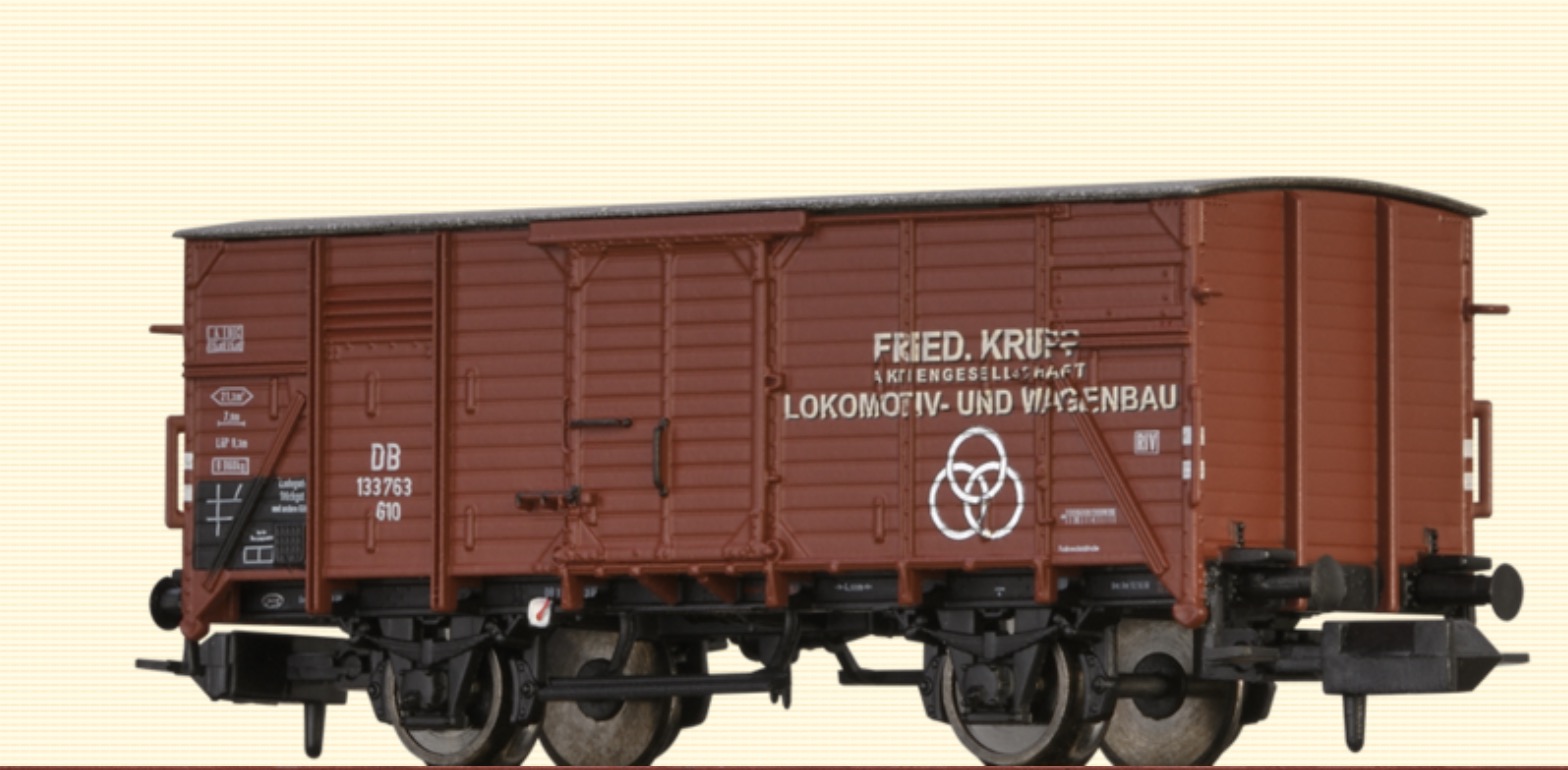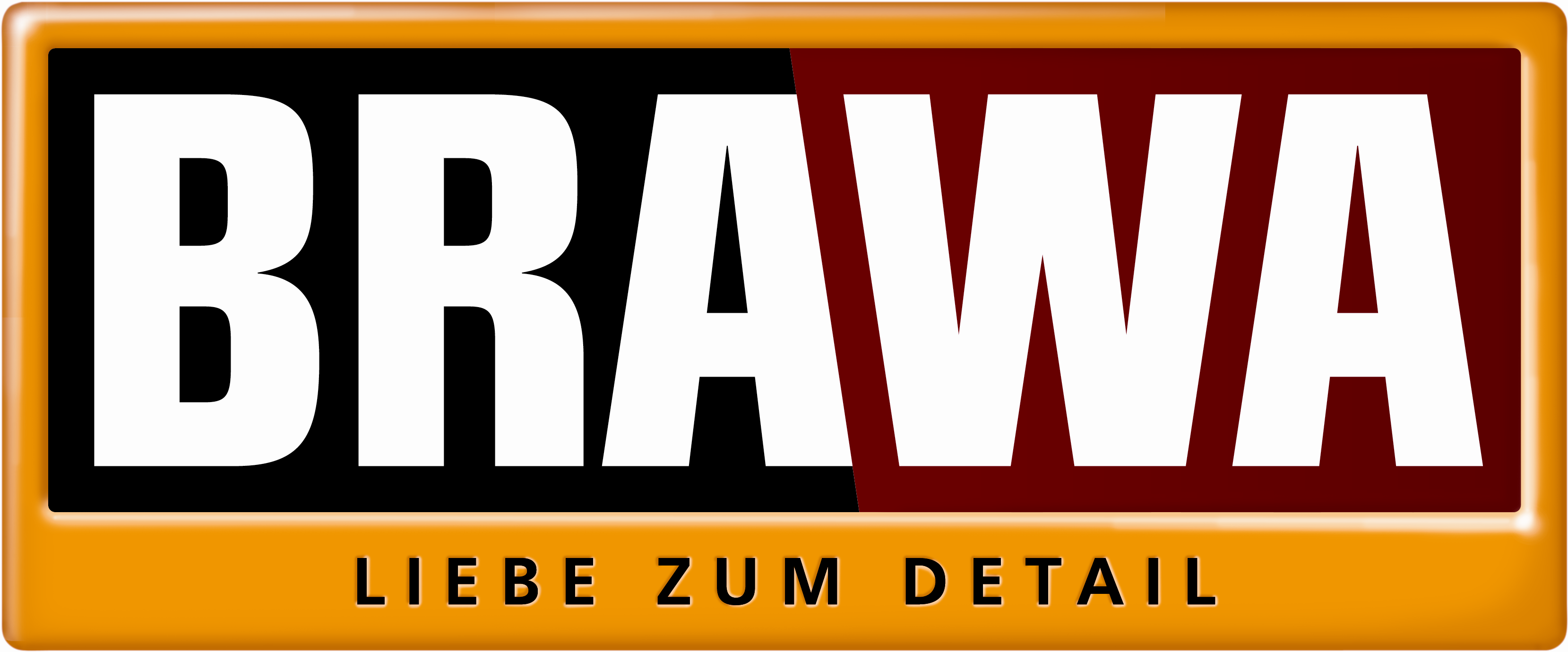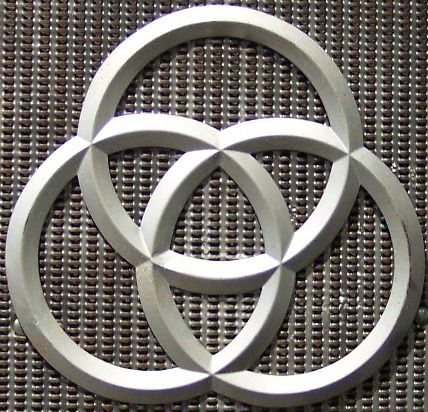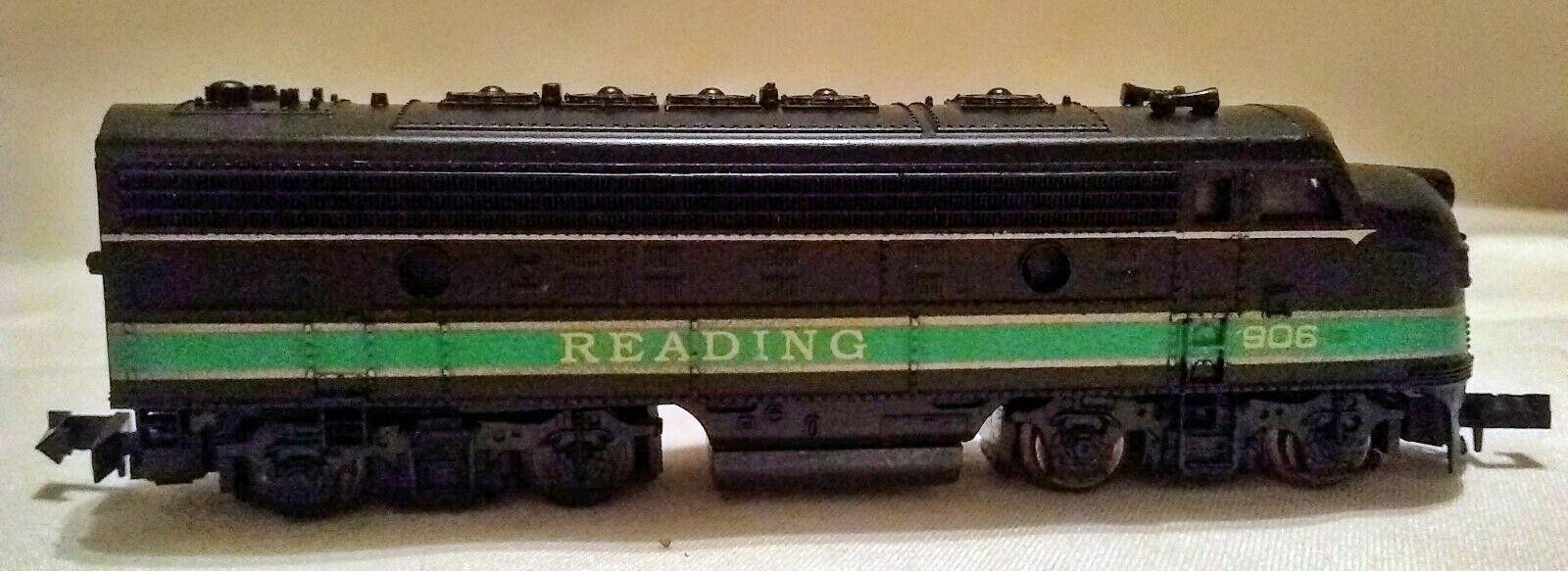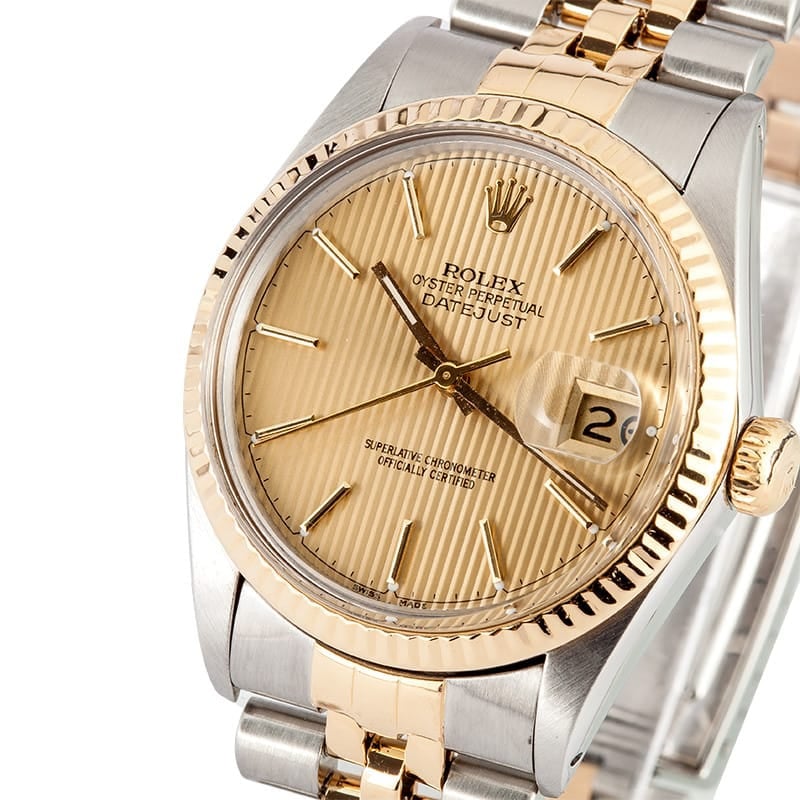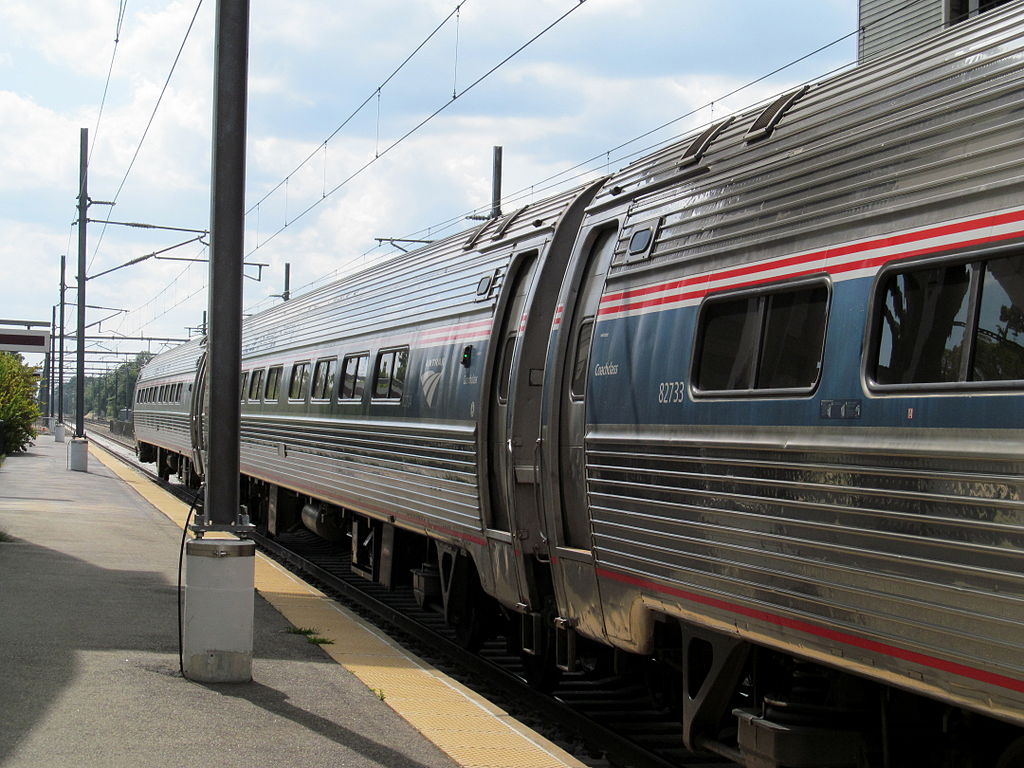Brawa - 67469 - Freight Car, Covered, G 10 - Krupp - 133763
| Stock Number | 67469 |
| Brand | Brawa |
| Manufacturer | Brawa |
| Body Style | Brawa Covered Freight Car G Class |
| Prototype | Freight Car, Covered, G 10 |
| Road or Company Name | Krupp (Details) |
| Reporting Marks | DB |
| Road or Reporting Number | 133763 |
| Paint Color(s) | Brown with Black Roof |
| Print Color(s) | White & Black |
| Coupler Type | Rapido Hook NEM Standard Pocket |
| Coupler Mount | Truck-Mount |
| Wheel Type | Nickel-Silver Plated Metal |
| Wheel Profile | Small Flange (Low Profile) |
| Item Category | Rolling Stock (Freight) |
| Model Type | Freight Car |
| Model Subtype | Covered |
| Model Variety | G Class |
| Scale | 1/160 |
Road Name History:
The Krupp family (see pronunciation), a prominent 400-year-old German dynasty from Essen, have become famous for their production of steel, artillery, ammunition, and other armaments. The family business, known as Friedrich Krupp AG, was the largest company in Europe at the beginning of the 20th century. It was important to weapons development and production in both world wars. One of the most powerful dynasties in European history, for 400 years Krupp flourished as the premier weapons manufacturer for Germany. From the Thirty Years' War until the end of the Second World War, they produced everything from battleships, U-boats, tanks, howitzers, guns, utilities, and hundreds of other commodities.
The dynasty began in 1587 when a trader named Arndt Krupp moved to Essen and joined the merchants guild. He then began buying vacated real estate from families who fled the city due to the Black Death and became one of the richest men in the city. Over the next three centuries his descendants began producing small guns during the Thirty Years' War and over time gradually acquired fulling mills, coal mines, and an iron forge. During the Napoleonic Wars, Friedrich Krupp founded the Gusstahlfabrik (Cast Steel Works) and began producing smelted steel in 1816, turning the company into a major industrial power. The foundations were laid for the steel empire that would come to dominate the world for nearly a century under his son Alfred. Krupp became the arms manufacturer for the Kingdom of Prussia in 1859 and later the German Empire.
Krupp was also a revolutionary company that paved the way for workers rights. Alfred pioneered a system in which if the worker pledged loyalty to the company, he would be offered an unprecedented amount of benefits and social programs including on site technical and manual training, accidental, sickness, and life insurance, housing (sometimes free), recreational facilities, parks, schools, bath houses, and department stores. Widows and orphans were guaranteed pay if their husbands and/or fathers were killed.
The company also produced steel used to build railroads in the United States, capped the Chrysler Building in 1929, and was the first to travel to the bottom of the Mariana Trench. During the Third Reich, Krupp supported Adolf Hitler and the use of forced labour. After the war Krupp was rebuilt from scratch and again became one of the wealthiest companies in Europe. However a recession in 1967 caused the company severe profit loss. In 1999 the Krupp firm merged with Thyssen AG to form ThyssenKrupp AG, a large industrial conglomerate.
Historically the Krupp business has been controversial in its association with wars in Europe. As a major weapons supplier to multiple sides in various conflicts, the Krupps at times received blame for the wars themselves or the degree of carnage that ensued.
From Wikipedia
The dynasty began in 1587 when a trader named Arndt Krupp moved to Essen and joined the merchants guild. He then began buying vacated real estate from families who fled the city due to the Black Death and became one of the richest men in the city. Over the next three centuries his descendants began producing small guns during the Thirty Years' War and over time gradually acquired fulling mills, coal mines, and an iron forge. During the Napoleonic Wars, Friedrich Krupp founded the Gusstahlfabrik (Cast Steel Works) and began producing smelted steel in 1816, turning the company into a major industrial power. The foundations were laid for the steel empire that would come to dominate the world for nearly a century under his son Alfred. Krupp became the arms manufacturer for the Kingdom of Prussia in 1859 and later the German Empire.
Krupp was also a revolutionary company that paved the way for workers rights. Alfred pioneered a system in which if the worker pledged loyalty to the company, he would be offered an unprecedented amount of benefits and social programs including on site technical and manual training, accidental, sickness, and life insurance, housing (sometimes free), recreational facilities, parks, schools, bath houses, and department stores. Widows and orphans were guaranteed pay if their husbands and/or fathers were killed.
The company also produced steel used to build railroads in the United States, capped the Chrysler Building in 1929, and was the first to travel to the bottom of the Mariana Trench. During the Third Reich, Krupp supported Adolf Hitler and the use of forced labour. After the war Krupp was rebuilt from scratch and again became one of the wealthiest companies in Europe. However a recession in 1967 caused the company severe profit loss. In 1999 the Krupp firm merged with Thyssen AG to form ThyssenKrupp AG, a large industrial conglomerate.
Historically the Krupp business has been controversial in its association with wars in Europe. As a major weapons supplier to multiple sides in various conflicts, the Krupps at times received blame for the wars themselves or the degree of carnage that ensued.
From Wikipedia
Brand/Importer Information:
Brawa Artur Braun Modellspielwarenfabrik GmbH & Co. was founded in 1948 by Artur Braun in Waiblingen, Germany, to distribute model trains from other toy makers; eventually they began to manufacture their own lighting accessories such as streetlights and signals. In 1963 they acquired the complete line of motorized trolleybus and ski lift models from Eheim. They also began to expand their own line to include scenery items, and by 1993 they'd added locomotives and rolling stock to their product range. This medium-sized business is today jointly managed by the second and third generations of the Braun family: Günter Braun, son of the founder, and his daughter Katrin Braun are the company's managing partners.
Brawa range covers HO, O and N scales. The N scale range is focused on European rolling-stock, German locomotives and accessories like signals, streetlights, clocks and telephone booths.
Here is how the company describes itself:
At BRAWA, continuity and sustainable thinking and action - as the particular strengths of a family business - have a double impact. Changes are carefully considered and strategic decisions taken on the basis of a long-term vision, thus enabling the company to respond quickly and deliberately to the demands of the market. In addition, cross-generation collaboration ensures a vibrant coexistence of tradition and innovation.
In short, our future course is set and all signals are pointing towards continuity and growth. Our presence at our site in Remshalden shows our commitment to this area and highlights the sustainable nature of our company's location in the region. Sustainability is, as it were, an intrinsic value of our family business.
Brawa range covers HO, O and N scales. The N scale range is focused on European rolling-stock, German locomotives and accessories like signals, streetlights, clocks and telephone booths.
Here is how the company describes itself:
At BRAWA, continuity and sustainable thinking and action - as the particular strengths of a family business - have a double impact. Changes are carefully considered and strategic decisions taken on the basis of a long-term vision, thus enabling the company to respond quickly and deliberately to the demands of the market. In addition, cross-generation collaboration ensures a vibrant coexistence of tradition and innovation.
In short, our future course is set and all signals are pointing towards continuity and growth. Our presence at our site in Remshalden shows our commitment to this area and highlights the sustainable nature of our company's location in the region. Sustainability is, as it were, an intrinsic value of our family business.
Item created by: CNW400
on 2023-08-04 10:37:07
If you see errors or missing data in this entry, please feel free to log in and edit it. Anyone with a Gmail account can log in instantly.
If you see errors or missing data in this entry, please feel free to log in and edit it. Anyone with a Gmail account can log in instantly.


